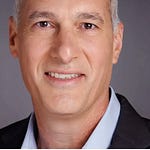A warm welcome to the 136 new subscribers who have joined since the last edition!
If you’re reading this and haven’t subscribed, sign up below to join a high-value and fast-growing network of over 1,760 climatetech entrepreneurs, investors, and industry leaders.
Here’s how The Green Techpreneur can help you:
For entrepreneurs
I interview extraordinary climatetech entrepreneurs and investors and share practical advice on how to build your business and find funding. It’s insightful, actionable and fun to read or listen to.
Do you want help with boosting your visibility, engagement & getting the connections you need to succeed?
For details visit...becomemorevisible and book a call if it resonates.
For climatetech investors
The Green Techpreneur publishes lists of pre-vetted startups seeking investment. Subscribe to be the first to know.
As a fourth generation farmer, Pablo Borquez Schwarzbeck is acutely aware that in farming industries, long-term security and resilience needs an urgent overhaul.
The climate crisis and Russia-Ukraine war exacerbated food insecurity issues this year, leading to a $2.3 billion World Bank designated food security fund, but farmers aren’t getting the support they need to secure their produce and business in the first place.
“Farmers are often in a group that is largely taken advantage of,” says Schwarzbeck, “they take on 90% of the liability that comes with growing crops – it doesn’t really make sense for produce farmers to take all the risk and not get the majority of the return for that commodity.
“Most of the products that we consume come from emerging economies, and often the emerging economies are the ones that have the most fractured and broken or least accessible capital markets.”
But an ounce of prevention is worth a pound of cure – what if there was a better way to support farmers so their harvests and income was sheltered from climate and macroeconomic shocks?
The question plagued Scharzbeck. He had travelled extensively throughout North and South America to meet farmers: “that’s where I really understood that the issues that I saw back home were the same issues everywhere,” says Schwarzbeck.
Agricultural commodities are often sold through intermediaries which means only a small percentage of the profits remain in the hands of the farmers: “a lot of the farmers will fail to make the product available to the end consumers because they don’t know where these consumers are ultimately – the clients that are willing to buy the product,” says Schwarzbeck.
The average piece of produce travels 1,600 miles to your plate, is handled x4 – x8 times due to non-value add middle-men, is rebranded x2 due to a fragmented market–making it extremely difficult to trace where produce has come from. Produce is marked up x3 – x6 as a result of changing hands so many times.
Was it possible to disrupt and eliminate these intermediaries to put more power in the hands of the producer?
Schwarzbeck set out to find answers. He launched ProducePay as a fintech and digital marketplace solution that gives farmers access to capital and connects produce-growers directly to the end buyer.
ProducePay also helps growers find end buyers in its marketplace and underwrites the farming and trading risk for growers, which involves weather, logistics, etc
Within 8 years since inception, ProducePay has helped 700 farms – worth about $4 billion of produce – get access to capital and receive the best return on their commodities.
What services do you offer farmers and how are you disrupting the market?
ProducePay provides Pre Season Financing from $200k to $5MM up to 12 months before harvest. It offers a new Quick-Pay service, which is a first-of-its-kind Quick-Payfinancing option that allows growers to maintain cash flow by getting up to 96% of the value of their shipments within 24 hours after a buyer accepts the product.
How does ProducePay strengthen farmers’ resilience?
We build strong technical infrastructure that connects farmers to the consumers and services to allow them to reach customers. As the alternative solution for farmers, we provide strong markets of consumption, strong pricing, along with the capital and the infrastructure to reach those clients – this we believe is the formula for maximising long-term yields.”
We built a mechanism for traditional funds in the United States to reach farms all across the world. And by doing so we help the people that are best equipped to grow the fruits and vegetables to reach global consumers.
The startup venture and investment world now looks at agriculture with a very different light because they have seen what the world without access to food looks like. And it’s very scary, right?
During the pandemic where access to food was in question, it was our ability to ultimately help these farmers get the product to these places like Los Angeles that allowed us to make sure that we brought healthy food to the local communities that we work in.
How does your sustainability programme work?
As part of its support offer for farmers, our sustainability and decarbonisation programme evaluates and offers support on:
EXPERTISE
Do they have the expertise, the company infrastructure, accountants and other experts to help them manage effectively?
COMMERCIAL
Do we need to help this person have the proper relationships to be able to move and sell the product?
SUSTAINABILITY
What we ultimately focus on is whether something could theoretically be done in perpetuity, or if you’re doing something that is creating short-term gain at the expense of the resources of the community.
Sustainability includes social responsibility. Are they doing things that ultimately make sure the people that consume this food will do so in a way that is healthy? Are you preserving the water to the point you’re not exploiting those resources?
We’ve launched the first decarbonisation initiative in fruit and vegetable farming, and by that we ultimately partnered with different experts to figure out how to help farmers understand how their particular commodity can reduce the carbon footprint of their farms – depending on the crop they’re farming. This includes anything from how they irrigate, what they apply to the soils and ultimately how they tilled the land.
What sort of growth have you seen?
In the last 18 months, we’ve tripled our market share. A lot of that has to do with our ability to take our model and successfully replicate it across different countries in the Western Hemisphere.
We’re very happy to see our model resonating with other geographies across the world. The produce industry has become largely globalised, and a lot of produce today is being grown in emerging economies. So it is essential for the success of our business and for the network effects that we can replicate our model across different different geographies.
We’re very excited to follow this through until we can bring a new reality that is largely available to the farming community across the world. We’ve grown from North America and the Americas and our next expansion is mostly focused in Europe.
If you were to look back in 10 years’ time, where do you want to be?
I’d like to be sitting down with my daughter and telling her once upon a time, the farming industry was much more impaired because they they lacked the technology or the data.
Ultimately, I think I can feel proud that I’m passing the baton on by showing her that everyone can help their industry in their own way. I did it by creating better technology, infrastructure and availability of resources. In some ways we can all help, so hopefully I can be passing the baton to my daughter, so she can start thinking about what she can do as a fifth generation farmer.
Do you have a mantra or a life philosophy that keeps you going?
My mantra is Be Better. I think humanity’s best moments or best innovations come from pushing yourself to exceed beyond our former self. It’s about having the humility to understand that regardless of who you are, how successful, or how enlightened, you can always learn something. If you can always see yourself as being one step before your next step to self improvement, then you can always be kinder or more philanthropic.
I think intergenerationally. Is this something that I would want my children to see me do? If the answer is yes, it means you’re doing something that you can feel proud of.
If you want to connect with ProducePay, reach out to: info@producepay.com
💥 Do you want help with boosting your visibility, standing out, & getting the connections you need to succeed?
For details visit...becomemorevisible and book a call if it resonates.
👉🏼 Job Ad
Library of Things is looking for a Back-End Developer
Library of Things exists to help people save money and reduce waste/ emissions, by affordably renting out tools like drills, sound systems and sewing machines from local spaces like libraries. We're currently providing this joyful alternative to wasteful consumerism from 11 locations around London, and soon many more around the UK.
We're looking for a brilliant Back-End Developer to join our joyful team of ~20.
Salary: Up to £50k (depends on experience)
Time input: 9-day fortnight (every second Friday off)
Location: Remote, but able to easily join monthly meetings in Bristol or London (& option to cowork weekly in our London office)
Perks: flexibility of time/ locations (you can work from abroad!), twice yearly team nature weekends, share options scheme, culture that prioritises wellbeing & joy
More details & apply: https://libraryofthings.co.uk/jobs












